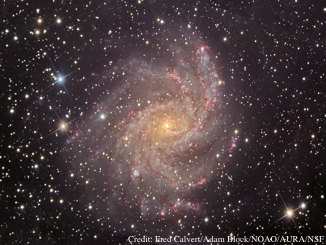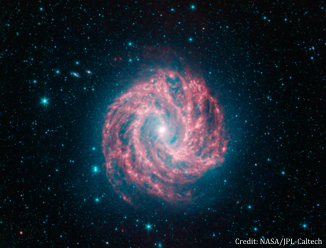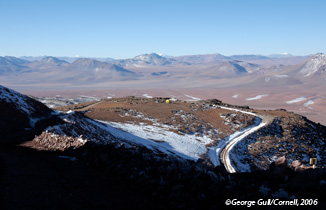About FYST
The Fred Young Submillimeter Telescope (FYST) will be a 6-meter diameter telescope with a surface accuracy of 10 microns, operating at submillimeter to millimeter wavelengths and sited at 5600 meters elevation on Cerro Chajnantor in the Atacama desert of northern Chile. The novel “crossed-Dragone” optical design will deliver a high-throughput wide-field-of-view telescope capable of illuminating more than 100,000 millimeter wavelength detectors (and many more at submillimeter wavelengths) so that large areas of the sky can be scanned rapidly. The high altitude, dry site offers superb observing conditions, yielding routine access to the 350 micron window as well as improved performance at longer wavelengths. Under the best conditions, observations in the 200 micron window will be possible. Deployment of FYST on Cerro Chajnantor will provide operational experience at high altitude, reducing risk for the future construction of a 25-meter submillimeter telescope.
FYST is specifically designed to measure the kinematic Sunyaev-Zel’dovich effect of galaxy clusters, to trace the appearance of the first population of star-forming galaxies through intensity mapping of their [CII] emission in the epoch of reionization, and to probe multiple spectral line tracers of the ISM over a range of environments in the Milky Way, Magellanic Clouds and other nearby galaxies. It will also be a next-generation Cosmic Microwave Background observatory.
The CCAT consortium includes Cornell University, the University of Cologne , the University of Bonn, Max-Planck-Institut für Astrophysik, and the Canadian Atacama Telescope Consortium (CATC), a consortium of the Canadian Universities: University of Alberta, the University of British Columbia, the University of Calgary, Dalhousie University, McGill University, McMaster University, Saint Mary's University (Halifax), the University of Toronto, the University of Waterloo, and the Western University. Researchers at additional institutes in the United States, Canada, Germany and Chile are involved in science planning and instrument development. CCAT operates in Chile thanks to a Cooperative Agreement with the University of Chile and under the auspices of the Ministry of Foreign Affairs of Chile.





